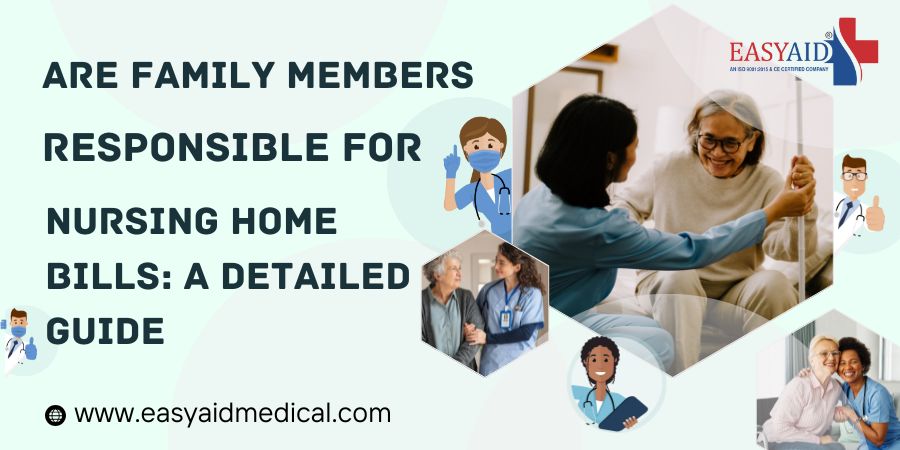Are Family Members Responsible for Nursing Home Bills
Sorting out finances with regards to nursing homes is never easy especially in cases where families are exaggerated with their tenuous ties and are unclear about who or if anyone is responsible for paying the bills. If you are one of those people then this article is written for you. Let’s discuss in detail if family members are legally or financially obligated to pay nursing home bills, alongside the regulations, exceptions, and effective ways to deal with additional costs.

Nursing Homes: The Payments and Bills Associated with It
Enrolling a family member in a nursing home comes with challenges and is a financial burden for most. Such costs typically consist of room and board, medical services, therapy, and personal assistance. The billing cycle and payment process can be hectic and complex for both patients and healthcare providers. The best strategy to deal with this challenge is that healthcare practices should outsource their nursing home billing services to a reputable provider. These companies make the payment process for both doctors and the patients. They divide the total cost into smaller, more manageable segments and properly explain to you about the balances. Still confused if family members are responsible for nursing home bills or not? Don’t worry, this article will explain everything. Keep reading!
In most cases, nursing home residents assume the major portion of the expenses, relying on their income, savings, or long-term care insurance policies. However, family members may occasionally feel obligated to bear costs due to various situations, creating legal obligations.
Also Read- The Sleep-Dementia Link: How Sleep Meds and Sleep Disturbances Impact Cognitive Health
Filial Responsibility Laws For Family Obligations: Things To Know
Filial responsibility laws allow nursing homes to seek payment for unpaid bills from a resident’s family. In states like Ohio and Wisconsin, adult children may be required to cover their parents’ long-term care costs if the parents can’t afford them. While over two dozen states have similar laws, they are rarely enforced.
For instance, if a resident of a nursing home had to settle unpaid nursing home bills and did not have other resources to pay, the nursing home might resort to filial responsibility laws which sought after Medicaid as the last resort. Many states, however, have a tendency to pay family members last and Medicaid comes first. Because family obligations laws vary from state to state, it is prudent to check with your local legislation to gauge any potential legal risks you may face.
Medicaid and Medicare: What are Important Alternatives
Medicaid and medicare are important nursing home cost coverage services. But this coverage is limited to some aspects of care: medicare helps a little bit with costs of rehabilitation for a short term but does not cover the cost of long-term support. Whereas Medicaid covers the full cost for those who are eligible based on their income and capital.
Most families need to know how Medicaid works since it normally has a spend-down provision meaning the applicant is required to give away some of their assets before being able to apply for this program. They should work with financial planners or elder law attorneys in order to be in full compliance with the law and protect their assets.
Also Read- Benefits of Improving Teeth Alignment with Orthodontics
Can Family Members be Forced to Sign Any Contracts?
During the intake process of a nursing home, family members could be required to fill out some admission or payment contracts. Nursing homes tend to have these agreements especially with their providers as a way to recover costs that haven’t been paid, these clauses make a person who has signed the contract liable for the unpaid bills. Always remember the assumption of responsibility under Beliefs and Contracts – this is done only in good faith and by being really reasonable.
Patients’ family members do not have the right to sign such contracts if they have not been given a power of attorney – this is prohibited by the federal government. In many cases, however, patients may be asked to sign such studies. You should explain that you are acting in the capacity of an attorney for the resident and not as a personal guarantor. Seeking legal assistance can help avoid these unintentional consequences.
What Happens When Funds are Not Available?
When a nursing home resident runs out of their personal funds, Medicaid will be the first top payer of long term care provided. But they might apply for these funds through an application process and this process can take time resulting in some delay of payments. Meanwhile, there is a time period during which family members may be asked to pay for these additional costs.
Communication with the billing department of the facility in question is crucial so as to make the payment plans or schedules clearer. Also, look at the possibility of engaging with elder care advocacy groups that will be able to help resolve the conflict and financial burdens .
Exemptions to Family Financial Responsibility
Though there are filial responsibility laws in place, there are a few exceptions in which nursing homes cannot bill families for their member’s medical expenses:
- Medicaid Coverage: Where a family is acting in a Medicaid program that is active, this coverage under the program pays for the care of that resident, thus making the family not liable.
- Contracts: In cases in which family members were not able to sign contracts with the nursing homes to guarantee payment, then they cannot be chased ever for these outstanding bills.
- State Enforcement: Families living in some states that have such laws can benefit because these laws are only on paper because enforcement is minimal and, in some instances, only in the form of a court judgment.
Knowing these exceptions is helpful when dealing with the costs of a nursing home as it helps you feel better psychologically
Ways to Deal with Sudden Funds Needs
To avoid yourself and your loved ones from the last minute funds need here are considerations:
- Early Approach: Urge the family member in considering a financial vehicle for long term care while they are still in a position to do so.
- Legal Boundaries: Engage the services of an elder law attorney to put in place powers of attorney and trusts which secure assets.
- Straight Forward Facts: Keep appropriate contact with nursing home attendants and make it clear who will be responsible for paying the bills.
- If hybrid strategy comprises these elements, appropriately, tensions can be eased and both the residents of nursing homes and their families can feel financially secure.
Final Remarks!
Determining if the family members are liable to pay for the bills of the nursing home has other factors with laws together with the contracts and funds. Contrary to expectation, nursing home billing’s purpose of making the process easier may not be that easy due to filial Responsibility Laws and qualifying for medicaid.
It is possible to deal with the burdens of nursing home care financially through self education and seeking professional guidance on the normative regulations of these issues. Rather, planning adequately and knowing your rights will ensure non exposure of your loved ones and yourself economically.


